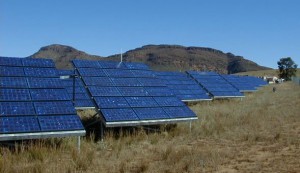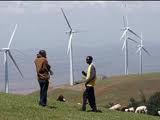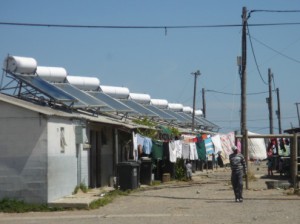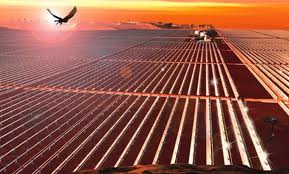 SIRIX is proud to be involved in the process of improving the energy supply and assess its environmental impact. The World´s emission problems have to be addressed in a proper way. Regardless where pollution is generated, the entire world is affected and concerned. Measures need to be taken to assure an environmentally friendly approach to new power installations and new technologies be supported och the expense of traditional coal and oil power stations. Local, regional and continental initiatives are currently supporting renavable installations and many African countries have legislation and support mechanisms approved or under way. Today’s possibilities of small scale generation will allow remote areras to have access to electricity thus being able to participate in a sound economic and social development. Sustainability and careful management of natural resources are key-words.
SIRIX is proud to be involved in the process of improving the energy supply and assess its environmental impact. The World´s emission problems have to be addressed in a proper way. Regardless where pollution is generated, the entire world is affected and concerned. Measures need to be taken to assure an environmentally friendly approach to new power installations and new technologies be supported och the expense of traditional coal and oil power stations. Local, regional and continental initiatives are currently supporting renavable installations and many African countries have legislation and support mechanisms approved or under way. Today’s possibilities of small scale generation will allow remote areras to have access to electricity thus being able to participate in a sound economic and social development. Sustainability and careful management of natural resources are key-words.
 SIRIX is supporting commercial development while advising its clients how to organize their Africa establishment and attain profitability and sound business practice.
SIRIX is supporting commercial development while advising its clients how to organize their Africa establishment and attain profitability and sound business practice.
EU Commissioner for Development, Andris Piebalgs said: ”Today 1.6 billion people worldwide have no access to electricity, most of them in sub-Saharan Africa and Southern Asia. Poor energy systems undermine growth potential in these countries from 1 to 2%. We need a reliable source of electricity to fuel development. Africa has a vast untapped renewable energy potential, ranging from hydro, to solar, wind, geothermal and biomass which could be used to ensure millions of people access to electricity. Today’s event is a step stone on the EU and Africa Partnership towards the ”renewable revolution”. It will also contribute to Africa’s efforts to reach the Millennium Development Goals and to secure future low-carbon growth”.
 Africa and the EU intend a joint action to bring access to modern and sustainable energy services to at least an additional 100 million Africans by 2020. This will be a contribution to the African objective of giving access to modern and sustainable energy to an additional 250 million people. Africa and the EU jointly intend to improve energy security by doubling the capacity of cross-border electricity interconnections and by doubling the use of natural gas in Africa, as well as doubling African gas exports to Europe. To enhance efficiency the follwing projects are currently considered:
Africa and the EU intend a joint action to bring access to modern and sustainable energy services to at least an additional 100 million Africans by 2020. This will be a contribution to the African objective of giving access to modern and sustainable energy to an additional 250 million people. Africa and the EU jointly intend to improve energy security by doubling the capacity of cross-border electricity interconnections and by doubling the use of natural gas in Africa, as well as doubling African gas exports to Europe. To enhance efficiency the follwing projects are currently considered:
- building 10,000 MW of new hydro power facilities;
- building at least 5,000 MW of wind power;
- building 500 MW of solar energy and tripling the capacity of other renewables;
- raising energy efficiency in Africa in all sectors.
A 10 year cooperation programme has been established between EU and AU aiming at supporting installations of renewable energy. period. Various initiatives provide a framework for supporting joint cooperation between African stakeholders and investments and transfer of know-how and technology. Focus is mainly on a regional and continental level.
 Conclusion
Conclusion
Africa needs electricity without emissions. so does the World. There are numerous industrial and technological applications available in the World, many suitable for implementation on the African continent. Africa is a continent of immense cultural diversity and local knowledge is key to the success of any investment, transfer of know-how, trade or joint venture. Many corporations have failed in Africa due to rigid business models suitable for the developed markets. In Africa each region is different and enhance the adaptation of appropriate strategies. Projects must be viable on a stand alone basis.
